Kim Jong Un – Who Is He and Why He Matters
When you hear the name Kim Jong Un, you probably picture nuclear drills, secretive meetings, and a country that seems cut off from the rest of the world. He’s the third generation of the Kim dynasty that has ruled North Korea since the 1950s. But beyond the headlines, there’s a human story of a man who went from a military academy in Switzerland to the most powerful seat in Pyongyang.
Early Life and Rise to Power
Kim was born in 1984, the younger son of Kim Jong Il, who inherited the throne from his own father, Kim Il Sung. Unlike his father, Kim Jong Un spent a few years abroad, attending a school in the Swiss Alps under a pseudonym. That stint gave him a glimpse of life outside the tightly controlled North Korean system, although he quickly returned home to learn the ropes of the ruling party.
In 2010, he was appointed a four‑star general – a rank that shocked many because he had no formal military experience. A year later, after his father’s death, the 27‑year‑old Kim was thrust into the spotlight as the new supreme leader. He cemented his position by reshuffling senior officials, promoting loyalists, and making bold public appearances that signaled a different style from his predecessor.
Key Policies and Global Impact
One of Kim’s first big moves was to accelerate the nuclear weapons program. High‑altitude missile tests and underground nuclear tests became regular events, putting North Korea in direct conflict with the United Nations and sparking intense diplomatic battles. At the same time, he launched a personality cult that floods the capital with giant portraits and murals of himself, echoing the propaganda of his grandfather.
Economically, Kim tried a mixed approach. He opened limited special economic zones where foreign investors could work, hoping to bring in cash without loosening political control. The COVID‑19 pandemic forced even tighter border closures, and the country suffered severe food shortages. Still, Kim’s regime manages to keep the population largely compliant through a combination of fear, propaganda, and a few small perks for party members.
On the diplomatic front, he surprised the world by meeting U.S. President Donald Trump in 2018 and again in 2019. Those summits were full of hand‑shakes, photo‑ops, and vague promises of denuclearisation. While no concrete steps emerged, the meetings showed that Kim could play the global stage when he wanted to.
For everyday North Koreans, life under Kim Jong Un is a mix of scarcity and strict surveillance. The government monitors internet usage, controls the news, and punishes dissent harshly. Yet there are small signs of change – a growing black market, smartphone smuggling, and occasional cultural exchanges with South Korea that hint at a slightly more open society.
So why does Kim Jong Un matter to you? His decisions affect global security, trade routes, and the balance of power in East Asia. Whether you’re watching a news report, studying international relations, or just scrolling through social media, his name shows up whenever the world talks about nuclear negotiations or humanitarian aid.
Understanding the basics of Kim Jong Un’s background, policies, and impact helps you make sense of those headlines. It also reminds us that behind the headlines is a leader trying to hold together a fragile regime while navigating an increasingly complex world.
